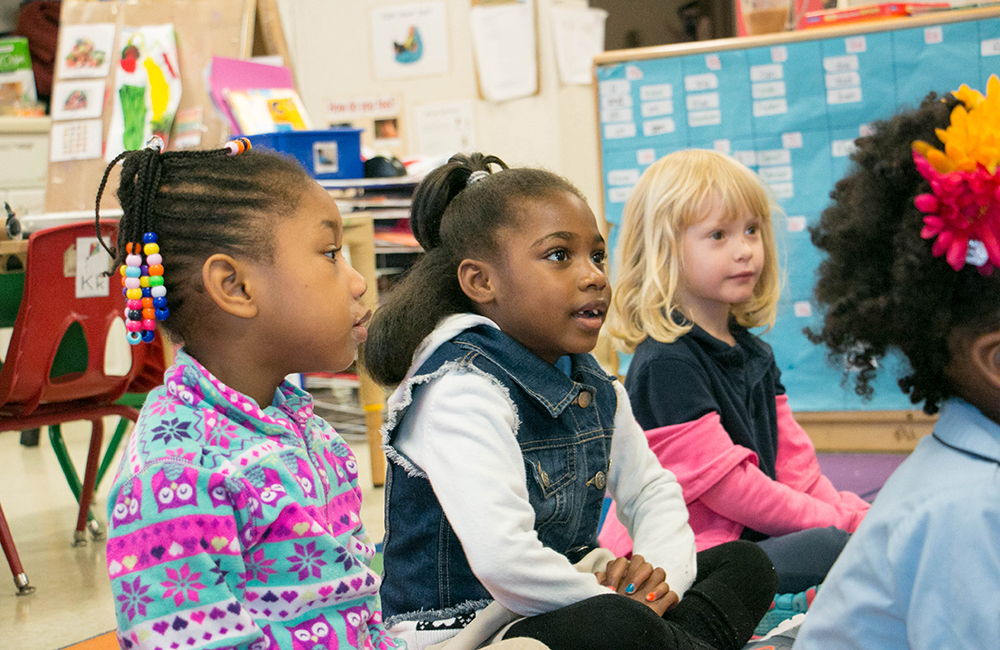Early Childhood
Early childhood is the time of greatest brain development and sets the stage for all later learning. Brain development begins in utero, while the neural pathways that support language, problem solving, behavior, social skills, and emotional health are built during a child’s earliest years. Many issues associated with poverty—maternal health and depression, environmental toxins, neglect, hunger—can adversely affect brain development, threatening a child’s success in school and life. However, strong relationships, quality pre- and post-natal care, developmental screenings, and high quality early education can help improve child outcomes. Below we profile a nonprofit with an evidence-based, comprehensive, and replicable educational approach to diminishing the learning gap for preschoolers.


Early Childhood
Early childhood is the time of greatest brain development and sets the stage for all later learning. Brain development begins in utero, while the neural pathways that support language, problem solving, behavior, social skills, and emotional health are built during a child’s earliest years. Many issues associated with poverty—maternal health and depression, environmental toxins, neglect, hunger—can adversely affect brain development, threatening a child’s success in school and life. However, strong relationships, quality pre- and post-natal care, developmental screenings, and high quality early education can help improve child outcomes. Below we profile a nonprofit with an evidence-based, comprehensive, and replicable educational approach to diminishing the learning gap for preschoolers.
What it does
To close the achievement gap between three- and four-year-old children from low income households and their more advantaged peers, this Washington, D.C.-based organization has designed a comprehensive instructional model. Called Every Child Ready (ECR), this model includes curriculum as well as resources to improve instruction, coaching, teacher professional development, and assessment.
AppleTree opened its first preschool in 2005 and spent six years developing the ECR model that officially debuted in 2011. As of 2017-18, AppleTree educates approximately 1,200 children at 10 charter preschools in high-need neighborhoods. It has reached an additional 1,000 children through nine partner schools and community-based organizations throughout the District of Columbia, as well as one in New York City.
How effective is it
All children attending AppleTree preschools, regardless of family income levels, advanced their learning and skills leading up to kindergarten. Students with risk factors for lower achievement, in particular, showed greater rates of growth in literacy and math skills, performing close to national averages on commonly used tests. Exposure to the ECR curriculum diminishes the achievement gap in early vocabulary, literacy, and math skills for at-risk children in AppleTree schools, according to a 2011-2013 external evaluation. A 2017 study also showed that teachers using the ECR model significantly outperformed a sample of non-users on the instructional support portion of a validated and commonly used assessment of preschool classroom and teaching quality (CLASS). Research has shown that a difference of just .25 on instructional support as measured by CLASS has meaningful impacts on students’ academic outcomes.
How you can help
You can support AppleTree directly, or fund the adoption and further evaluation of the ECR model in additional partner schools. Any amount is helpful: from $25 for classroom supplies like age-appropriate books and fingerpaint, to $3,000 which can provide an at-risk child with two years of exposure to the Every Child Ready model within AppleTree’s own schools. The $3,000 covers the difference between existing public funding and the cost of providing the program. For partner schools, AppleTree offers a set-up package of ECR books, supplies, and online services for $5,000 for a classroom of 20 to 25 children. In subsequent years, the cost is $2,500 per classroom and includes the curriculum, assessment and reporting, and year-round support for professional development. Implementation costs vary depending on school size and the degree to which the partner school will need to supplement or upgrade its current level of staffing and resources.
Personalize this project
You can help ECR continue to expand to additional partner schools and districts. Alternatively, you can support access to other high quality preschool and early care models nationally or within your own community. For example, Educare runs evidence-based early care centers that serve as quality models in 18 communities across the U.S. For additional high quality early childhood models, visit our Early Childhood Donor Toolkit.
